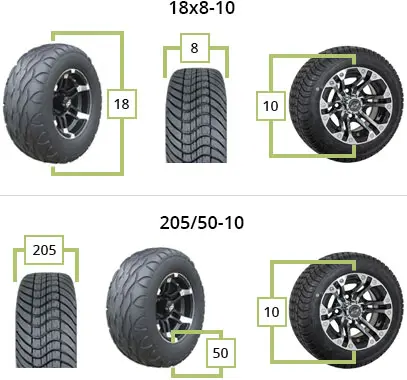
Golf Cart Wheel Sizing Explained
- Michael
- Golf Cart Parts
All of the modifications done on golf carts of souped-up variants ignore the crucial factor of the wheels because making the right selection is the first thing one needs to get right. After all, golf cart enthusiasts know full well that each and every part of their vehicle must be tailored to maximize both performance and looks. A correctly proportioned golf cart wheel size makes a huge difference in appearance, handling, stability, and ride comfort. Here, we are going to address the details of golf cart wheel sizing associated with dimensions, tire sizing, maintenance, and other aspects of the matter.
Understanding Golf Cart Wheel Dimensions
Rim Diameter
- Definition and Measurement: Rim diameter is the size of the wheel from end to end, typically measured in inches.
- Influence on Appearance: Larger rim diameters are associated with a modern look, while smaller diameters provide a classic or vintage aesthetic.
- Impact on Tire Selection: Rim diameter directly affects tire choice. Smaller rims require taller sidewall tires to maintain overall diameter, while larger rims accommodate lower profile tires for a sportier appearance.
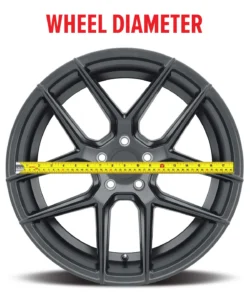
Width
- Definition and Measurement: Width refers to the distance between the inner and outer edges of the rim.
- Effects on Tire Contact Patch: Wider wheels offer a broader contact patch, enhancing grip and stability, especially off-road. Conversely, narrower wheels reduce rolling resistance and may improve fuel efficiency.
- Considerations for Fitment: Excessively wide wheels may rub against chassis or suspension components, requiring modifications for proper fitment.
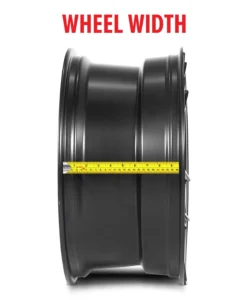
Offset
- Definition and Measurement: Offset is the distance between the wheel’s mounting surface and its centerline.
- Influence on Fitment and Clearance: Positive offset wheels sit closer to the vehicle’s centerline, while negative offset wheels extend further outward. Proper offset ensures adequate spacing between the wheel and suspension components, preventing interference during steering or suspension movement.
- Impact on Stability and Handling: Offset affects the vehicle’s track width, influencing stability and handling characteristics. Choosing the appropriate offset is crucial for achieving the desired stance and clearance without compromising safety or performance.
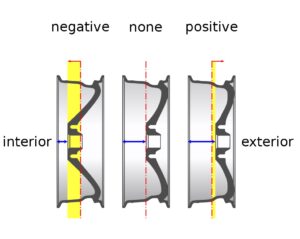
Common Golf Cart Wheel Sizes
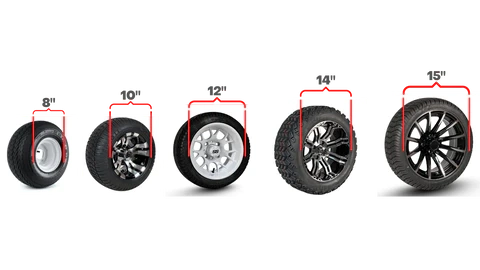
8-inch:
10-inch:
12-inch:
14-inch:
15-inch:
Factors to Consider When Choosing Golf Cart Wheels
Terrain and Usage Considerations
First and foremost, the location where you predominantly use your golf cart for mobility factors majorly in the selection of the set of wheels. The thick wheels with robust construction and large traction are fundamental in a situation where you travel rugged terrain or off roads almost regularly. However, if you tend to ride predominantly on flat, tarred roads, wheels designed for such road surfaces may be better suited.
Consideration of Load Capacity
An important consideration for tire sizing also is load ability. The sizes of golf carts are also different and are referred outside for various activities such as recreational cruising and heavy-duty hauling. Maximizing the tire life and making safe operations are dependent on such a factor as ensuring that the tires can support the weight of the cart and its contents.
Personalization options and styling preferences
Golf cart wheels are very diverse in terms of styling, finishes and build quality enabling customization to fit individual preferences and aesthetics of the rest of the cart. Some people like modern and minimalistic designs while others prefer traditional and simple aesthetics but both types are laudable.
Compatibility with Tire Selection
Without a doubt, it is important to check that the wheels you select will work with the tires that you plan to use. No tire is a perfect fit, but; Belonging to these areas, there are additional ones that can be considered, for instance, load capacity and speed rating.
Durability and Quality Construction
The best wheels for long-term performance and reliability should be high-quality, expensive, but durable wheels made from superior materials. The best thing is to buy wheels made of materials that include aluminum or steel having a hard structure and which ensure resistance to corrosion. Thirdly take note of wheel type specifications like weight holding strength alongside warranties.
Budget Considerations
Prices of wheels could differ tremendously as a result of various materials, designs, and brands used to manufacture them. By setting your budget and outlining your priorities in terms of style, performance and durability, you are given a much clearer idea as to which wheels are going to achieve the desired level of functionality and aesthetic without costing you an arm and a leg.
Golf Cart Wheel Maintenance Tips
Regular Checks
- Tire pressure: Check air pressure at least weekly (more often when riding in extreme temperatures) and inflate to manufacturer's recommended PSI.
- Visual inspection: Look for cracks, cuts, bulges, or signs of uneven wear on tires and rims.
- Lug nuts: Ensure they are properly tightened (refer to owner's manual for torque specs).
- Wheel alignment: Check for uneven tire wear, pulling to one side, or difficulty steering, which could indicate misalignment.
Cleaning
- Wash wheels regularly with mild soap and water to remove dirt, debris, and brake dust. Avoid harsh chemicals or abrasives.
- Dry wheels thoroughly to prevent rust and corrosion.
Storage
- Store your golf cart on a level surface when not in use.
- If storing for extended periods, inflate tires slightly above recommended pressure to prevent flat spots.
- Cover wheels to protect them from sun and weather damage.
Additional Tips
- Rotate tires regularly: This helps ensure even wear and extends tire life. Consult your owner's manual for the recommended rotation schedule.
- Balance wheels: Improperly balanced wheels can cause vibrations and uneven tire wear. Have them balanced periodically, especially after hitting bumps or curbs.
- Address issues promptly: Don't ignore warning signs like vibrations, wobbly wheels, or unusual tire wear. Get them checked by a qualified professional.
- Keep records: Maintain a log of your wheel maintenance activities, including dates, tire pressures, and any repairs or replacements.
Ensuring Optimal Performance and Longevity
As such, knowing about golf cart wheel sizing has to do with maintaining ideal performance, safety as well as longevity of the vehicle. By taking into account factors, for example, billeting location, tire-sizing, and making repairs, you will bring this issue to your golf cart heart’s content. An interesting fact is that irrespective of whether you are cruising across the greens or trying your luck in the uneven landscape, having the appropriate wheels and the tires are indeed a vital asset as far as enjoyment goes. Take charge of your golf cart experience today. Explore the best wheel options from one of the best golf cart dealers in Austin, Golf Carts of ATX. Give us a call now!

Frequently Asked Questions
How do I determine the correct tire size for my golf cart?
To determine the correct tire size, refer to your cart’s manual or consult with a knowledgeable dealer. Consider factors such as terrain, load capacity, and desired performance characteristics.
Can I install larger wheels on my golf cart for improved performance?
While larger wheels may offer certain performance benefits, such as increased ground clearance and enhanced traction, it’s essential to ensure compatibility with your cart’s specifications and suspension system.
What is the typical lifespan of golf cart tires?
Golf cart tires generally last between 4 to 6 years, depending on factors such as usage frequency, terrain conditions, and proper maintenance. Regular inspections and timely replacements can help maximize tire lifespan and ensure continued safety.
Are there specific tire options recommended for off-road golf cart use?
Yes, for off-road usage, consider tires with aggressive tread patterns and robust construction to handle rough terrain effectively. Look for options labeled as “all-terrain” or “off-road” for enhanced traction and durability.
How are golf cart wheels measured?
Golf cart wheels are measured by their diameter, width, and bolt pattern. Diameter and width are typically measured in inches, while the bolt pattern indicates the number and arrangement of bolt holes on the wheel hub.
What size wheels fit a golf cart?
The size of wheels that fit a golf cart varies depending on the cart’s make and model. Standard golf cart wheels usually range from 8 to 12 inches in diameter and 7 to 10 inches in width. It’s essential to consult the cart’s manual or a dealer for compatibility and fitment.







